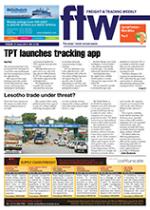Fears have been raised over
the impact on trade of last
week’s political unrest in
Lesotho.
The country’s three main
political parties have agreed
to stay in a ruling coalition
following emergency talks
over the weekend, at least
temporarily cooling a political
crisis that many feared would
lead to a coup.
The World Bank, in
its World Development
Indicators for 2014, forecast
a 4.1% gross domestic
product (GDP) growth for
Lesotho for 2014, with a
marginal 4.4% increase
projected for 2015. The Bank
warns however that political
unrest could weaken growth.
The landlocked country
is “heavily dependent”
on South Africa and its
Southern African Customs
Union (Sacu) partners for
trade. 95.2% of the country’s
imports come from South
Africa and it exports 48.9%
of its goods to the country,
according to the World
Trade Organisation (WTO).
Though there is a freight rail
link between South Africa
and Lesotho, the majority
of goods are transported by
road via the main Maseru
Bridge border (pictured
here).
News reports, including
by the Mail & Guardian and
Al Jazeera news, speculate
however that with Lesotho’s
parliament set to be suspended
until February 2015, and
elections not until 2017, there
are doubts about how long the
shaky coalition will hold.
The March 1998 riots,
following parliamentary
elections, had a disastrous
effect on the country’s economy,
destroying nearly 80% of
commercial infrastructure
in the capital of Maseru,
according to Wikipedia.
CAPTION
Lesotho border

